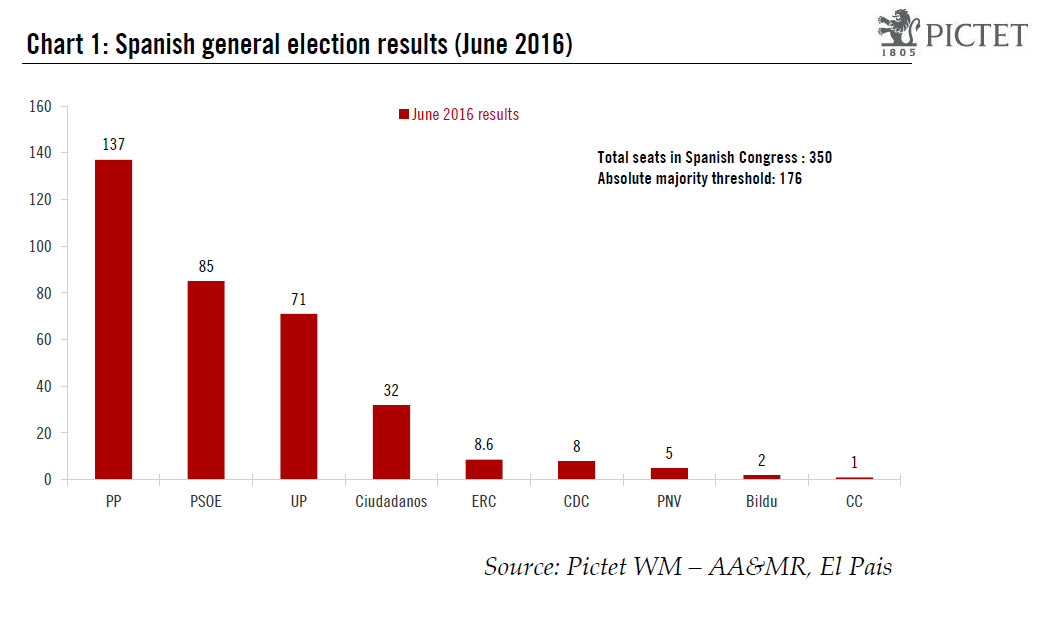Spain will try to break its nine-month political stalemate this week. Two months after the second round of general elections in Spain on 26 June, no government has been formed. Mariano Rajoy, the Popular Party (PP) leader and caretaker prime minister has been nominated by the king to head the government. The investiture debate will start on August 30, with a confidence vote on August 31. If unsuccessful, a second vote will be held on September 2, with a lower threshold for success (simple majority).Given recent statements by political leaders, the chances that Rajoy will garner enough support to win the first or the second confidence vote in Congress are very low. If no PM is elected within two months of the first confidence vote, parliament will be dissolved and new general elections will be called.The main development since the 26 June elections has been the political shift by the liberal Cuidadanos. The party proposed a six point plan to the PP as its condition to support Rajoy at the investiture debate. The PP accepted, and on 28 August both parties agreed on a policy plan in exchange for Cuidadanos’ support in the coming investiture vote.Nevertheless, the support of Cuidadanos (32 seats) and the regional CC (1 seat), will only give Rajoy 170 votes. He will need six more for an absolute majority in the first round.
Topics:
Nadia Gharbi considers the following as important: Macroview, Mariano Rajoy, Spain, Spanish economy, Spanish politics
This could be interesting, too:
Marc Chandler writes The Dollar’s Recovery has been Extended, but it may Give North American Operators a Better Selling Opportunity
Marc Chandler writes US Yields and Dollar Rise After US Government Closure Averted
Marc Chandler writes China Steps away from the Abyss and Animal Spirits are Rekindled
Marc Chandler writes Markets are Less on Edge as the Darkest Scenarios seem Less Likely
Spain will try to break its nine-month political stalemate this week.
Two months after the second round of general elections in Spain on 26 June, no government has been formed. Mariano Rajoy, the Popular Party (PP) leader and caretaker prime minister has been nominated by the king to head the government. The investiture debate will start on August 30, with a confidence vote on August 31. If unsuccessful, a second vote will be held on September 2, with a lower threshold for success (simple majority).
Given recent statements by political leaders, the chances that Rajoy will garner enough support to win the first or the second confidence vote in Congress are very low. If no PM is elected within two months of the first confidence vote, parliament will be dissolved and new general elections will be called.
The main development since the 26 June elections has been the political shift by the liberal Cuidadanos. The party proposed a six point plan to the PP as its condition to support Rajoy at the investiture debate. The PP accepted, and on 28 August both parties agreed on a policy plan in exchange for Cuidadanos’ support in the coming investiture vote.
Nevertheless, the support of Cuidadanos (32 seats) and the regional CC (1 seat), will only give Rajoy 170 votes. He will need six more for an absolute majority in the first round. In the second round, he would need 11 abstentions, which could come from the Socialist party (PSOE; 85 seats) and other regional parties such as the Basque Nationalist party (PNV; 5 seats).

Case 1: Abstention by the PSOE
The deal between the PP and Cuidadanos has increased the pressure on the PSOE to avoid more weeks of political uncertainty and possible new elections. Several meetings are scheduled before the investiture debate where the PSOE might revisit its position.
So far, the PSOE has reiterated its intention to vote No. It prefers to delay a decision until October, after two key regional elections on 25 September in Galicia and the Basque Country, when its federal committee will meet.
Case 2: Support from regional parties
The PNV, the Basque regional party, supported the PP in 1996 for the investiture of Jose Maria Aznar. However, this time it has consistently stated that it will vote against a PP government. Party leaders fear that supporting Rajoy could harm their regional election campaign. PP and Cuidadanos have a pro-national-unity stance, whereas the PNV favours Basque autonomy.
Overall, the chances of Rajoy succeeding in his first attempt to be re-appointed PM seem low at this stage. This will mean a 2-month deadline (31 October) for parties to find consensus and avoid a third round of elections in December.
The PSOE might reconsider its position after the regional elections, especially as it could be penalised for blocking the formation of a government in case of new general elections. PSOE voters narrowly prefer a PP-led government to a new ballot, according to recent polls.
Other alternatives, such as a left wing coalition (PSOE and Unidos Podemos) seem unlikely. The PSOE has so far rejected advances from Podemos for both ideological and practical reasons.
Overall, third elections this year cannot be ruled out. But a deal to form a PP-led minority government before the 31 October deadline is still possible.
Spain has posted robust growth figures despite political stalemate. For the remainder of 2016 and 2017, Spanish GDP should continue to outperform the rest of the euro area. However, a prolonged state of political uncertainty is likely to reduce the appetite for more far-reaching structural and fiscal reforms.
